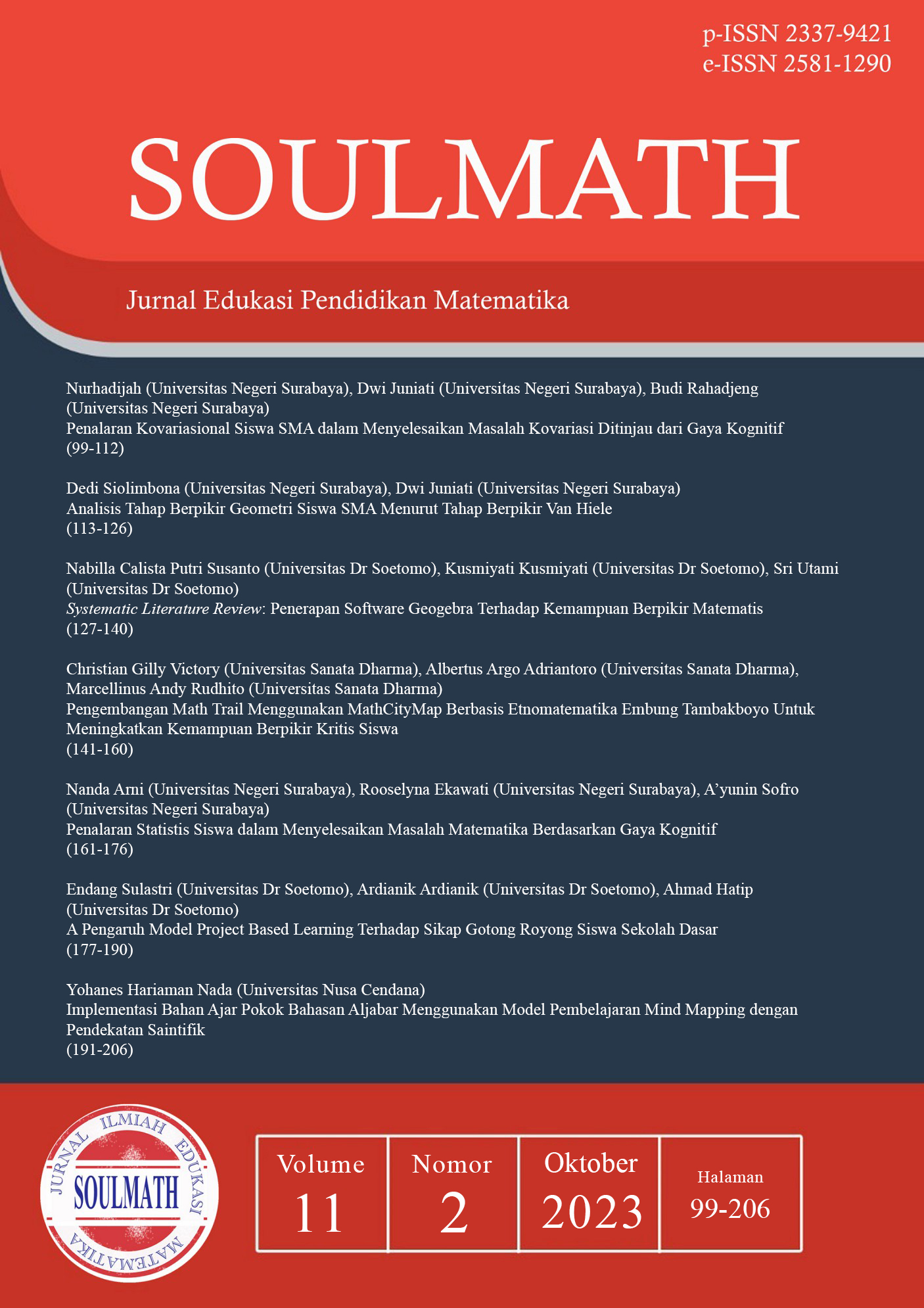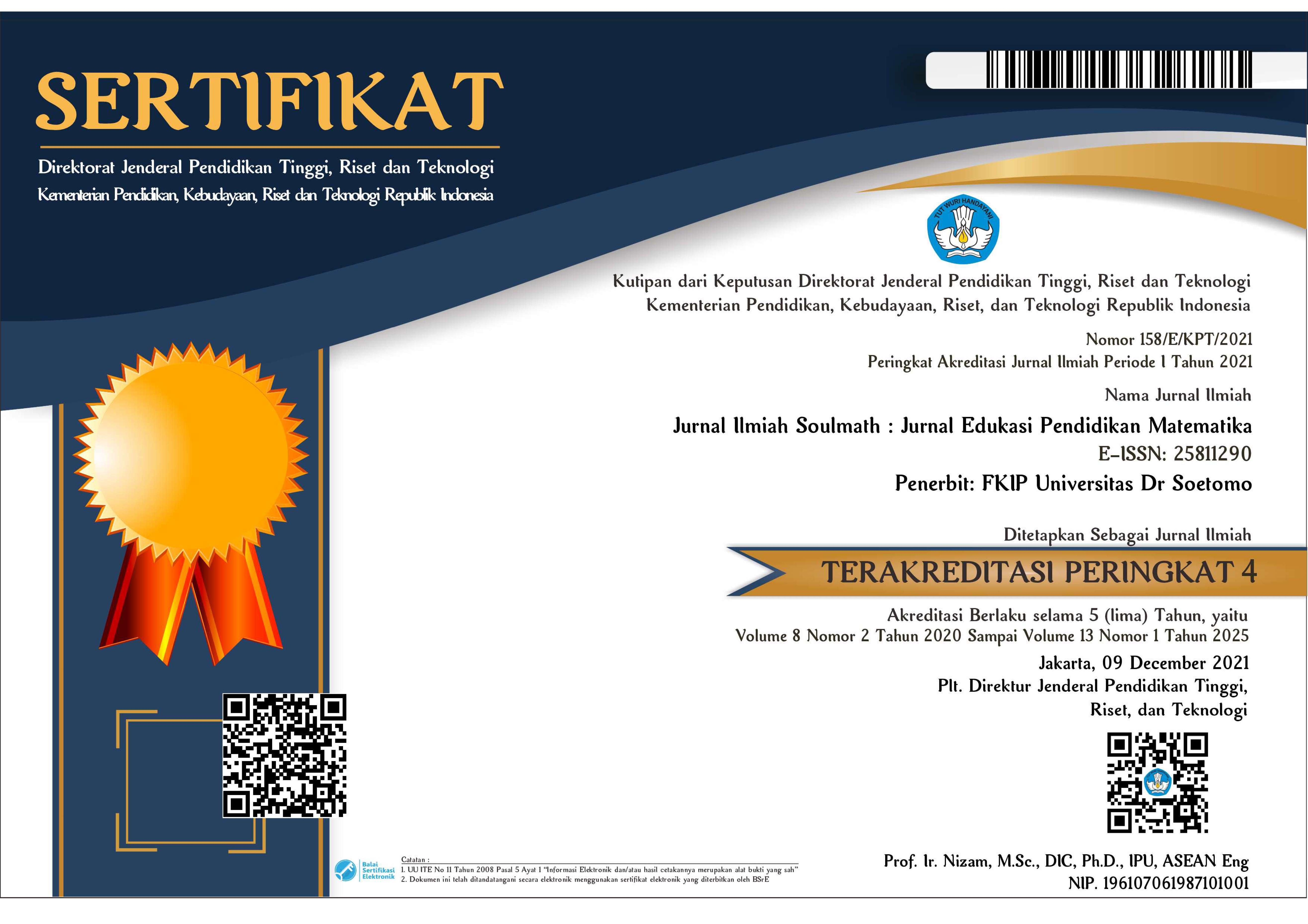Penalaran Kovariasional Siswa SMA dalam Menyelesaikan Masalah Kovariasi Ditinjau dari Gaya Kognitif
 Abstract views: 274
,
Abstract views: 274
,
 6239 (Bahasa Indonesia) downloads: 121
6239 (Bahasa Indonesia) downloads: 121
Abstract
Abstract
Covariational reasoning is related to the problem of the relationship between two variables which includes visual skills in constructing graphs. The purpose of this research is to describe the covariational reasoning of high school students with field-dependent and field-independent cognitive styles in solving covariation problems. This type of research is qualitative research. Subjects in this study were 1 student with a field-dependent cognitive style and 1 student with a field-independent cognitive style by controlling for gender equality and mathematical ability. The main instrument (researchers themselves) and supporting instruments in the form of the GEFT test, TKM (mathematical ability test), TK (covariation test), and interview guidelines were the instruments used in this study. The results showed that students with field-dependent and field-independent cognitive styles were able to identify the variables involved in the covariation problem and construct the relationship between the two variables that had been identified. The pattern of variation is determined by adjusting the magnitude of the variable variation and dividing the bottle into several parts to compose the variation pattern. Construct the relationship between the two variables by constructing a graph of the known variables and drawing a graph of the pattern of changes in the relationship between the two variables.
Keywords: Covariational Reasoning, High School Student, Cognitive Style, Covariation Problems
Abstrak
Penalaran kovariasional memiliki keterkaitan dengan masalah hubungan antara dua variabel yang mencakup keterampilan visual dalam mengkonstruksi grafik. Tujuan dari penelitian ini untuk mendeskripsikan penalaran kovariasional siswa SMA dengan gaya kognitif field-dependent dan field-independent dalam menyelesaikan masalah kovariasi. Jenis penelitian ini adalah penelitian kualitatif. Subjek dalam penelitian ini adalah 1 siswa dengan gaya kognitif field-dependent dan 1 siswa dengan gaya kognitif field-independent dengan mengontrol kesetaraan gender dan kemampuan matematika. Instrumen utama (peneliti sendiri) dan instrumen pendukung berupa tes GEFT, TKM (tes kemampuan matematika), TK (tes kovariasi), dan pedoman wawancara merupakan instrumen yang digunakan dalam penelitian ini. Hasil penelitian menunjukkan bahwa siswa dengan gaya kognitif field-dependent dan field-independent mampu mengidentifikasi variabel-variabel yang terlibat dalam masalah kovariasi dan mengkonstruksi hubungan antara kedua variabel yang telah diidentifikasi. Pola variasi ditentukan dengan menyesuaikan besarnya variasi variabel dan membagi botol menjadi beberapa bagian untuk menyusun pola variasi. Mengkonstruksi hubungan antara dua variabel dengan membangun grafik terhadap variabel-variabel yang diketahui dan menggambar grafik pola perubahan hubungan antara dua variabel.
Kata kunci: Penalaran Kovariasional, Siswa SMA, Gaya Kognitif, Masalah Kovariasi
Downloads
References
NCTM. (2009). Principles and Standards for School Mathematics. United States of America : The National Council of Teachers of Mathematics, Inc..
M. Carlson, S. Jacobs, E. Coe, S. Larsen, and E. Hsu, “Applying covariational reasoning while modeling dynamic events: A framework and a study,” J. Res. Math. Educ., vol. 33, no. 5, pp. 352–378, 2002, doi: 10.2307/4149958.
O. Koklu, “An Investigation of College Students, Florida State University Libraries,” 2007.
P. W. Thompson and M. P. Carlson, “Variation, covariation, and functions: Foundational ways of mathematical thinking,” Compend. Res. Math. Educ., no. November 2016, pp. 421–456, 2017.
D. Slavit, “An alternate route to the reification of function,” Educ. Stud. Math., vol. 33, no. 3, pp. 259–281, 1997, doi: 10.1023/a:1002937032215.
L. A. Saldanha and P. W. Thompson, “Re-thinking Covariation from a Quantitative Perspective: Simultaneous Continuous Variation,” Proc. Annu. Meet. Psychol. Math. Educ. - North Am., vol. 1, no. 1, pp. 298–304, 1998.
Witkin. (1973). The Role of Cognitive Style in Academic Performance And In Teacher-Student Relations. Research Bulletin. New Jersey: Educational Testing Service.
A. Ş. E. N. Zeytun, B. Çetİnkaya, and A. K. Erbaş, “Matematik Öğretmenlerinin Kovaryasyonel Düşünme Düzeyleri ve Öğrencilerinin Kovaryasyonel Düşünme Becerilerine İlişkin Tahminleri,” vol. 10, no. 3, pp. 1573–1612, 2010, doi: 10.1016/j.ijedu.







